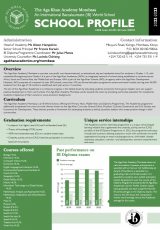Fatema Sheikh (Class of 2012): Advocating Educational Equality
Fatema Sheikh carries the lessons she learnt during her time at the Aga Khan Academy Mombasa with her to date.
Fatema joined the Aga Khan Academy Mombasa community in 2009 and graduated in 2012. She is currently pursuing a Bachelor of Science in consumer behaviour and marketing at the University of Reading on a full scholarship – an achievement for which she appreciates the support she received at the Academy through university counselling. She has had a colourful university career so far and hopes to graduate with her degree in the summer of 2015.
In the summer of 2013 after her first year at university, Fatema underwent a three-month internship with Champions Life Academy – an organisation which recruits and trains undergraduate students from universities to raise funds for various charities.
“This internship appealed to me, especially because it was related to my course of study as well as being able to support a worthwhile cause.”
She raised funds for a charity called Action for Blind People.
“This internship strengthened a lot of my skills, such as communication, negotiation and time management as well as improving my people skills tenfold. I am now able to approach and communicate with anybody.”
In addition to the work she did over the summer, Fatema was also heavily involved in various community activities through the university’s RED Award scheme.
Currently, she spends her time as a volunteer working with special needs children. Her desire to get involved with something like this was sparked during her time at the Academy in Mombasa. As part of her creativity, action, service (CAS) component of the Diploma Programme (DP), she spent time working with children in the special support unit of the Junior School, helping them with one-on-one or small group sessions on areas such as reading and comprehension.
“As difficult as it is, it is equally rewarding. When you get the child to enjoy what they are doing and play a part in helping them learn, it is very fulfilling.”
One situation she reflects on is her success in working with a student with several impairments, such as delayed speech, hearing impairment and a slight problem with balance.
“Helping and encouraging her made me feel like I was contributing to her understanding of various concepts," she says. "Working with children is always a two-way thing – they teach you as much as you teach them.”
In the past, she has also been involved in cultivating a garden at a school as well as volunteering at a family church in Reading during Christmas.
Fatema also places great worth on the advice she got from the Academy in preparation for university.
“My experience at the Academy could not have prepared me for life at university any better. While at the Academy, I was immersed in a diverse and multicultural environment which allowed me to adjust relatively easily to university where I was and still am constantly meeting people from different backgrounds.”
Having studied in this environment made her more open-minded and accepting of other people, and that has contributed to her being able to make friends and interact with people more easily. She also reflects on the value the International Baccalaureate (IB) DP added to her education.
“Deciding to do the IB DP is probably one of the smartest decisions I have made. I feel that the work ethic and skills such as time management required to do the programme have prepared me to take on any challenge.”
However, it was not just the academic component of the programme that pushed Fatema to stretch her limits. The DP's CAS component requires students to be actively involved in extra-curricular activities, and the theory of knowledge lessons encourages students to think critically in all disciplines. She commends both these aspects of the programme for instilling values in her that have become intrinsic to the way she lives her life.
“It made me into a more well-rounded and holistic individual,” she says. “It prepares you for life outside of school and makes you think about things that would not cross your mind or that you normally would not consider important. My ability to think and analyse situations critically has improved significantly due to constantly being challenged throughout the programme.”
Fatema has also been able to think about the time she has spent away from home and how her experience at the Academy prepared her for life in a new environment. The abundance of the AKA Mombasa alumni at the University of Reading was a part of that, and she was able to form connections quickly within the community. She also felt that the Academy offered education and opportunities just as good, if not better, than the schools in more developed places such as England, which made it very easy to transition into the unfamiliar environment.
“The Academy and the IB encourages independent thinking and this served me well since it was the first time I was living away from home for a long period and where I would have to make a lot of decisions on my own.”
A lot of Fatema’s involvement in her local community at university is inspired by the ethics she picked up at the Academy. One of the projects of which she is particularly proud is an outreach programme she conducted while interning for the Kenya School Improvement Project (KENSIP) as part of the Aga Khan Foundation internships offered to DP students at the Academy. She visited rural schools and worked with the adolescent girls there towards educating and counselling them on the day-to-day challenges faced. Initially, she focused on identifying the key issues to be tackled and then tried to come up with a way in which sensitive issues such as abuse, early pregnancy and the menstrual cycle could be approached.
“I formed a very close bond with the girls I worked with as well as their teachers. I truly felt like I helped to make a difference and taught them something worthwhile. Although I spent most of my time with the girls, I also included the boys and led forums which discussed issues such as bullying and drug abuse.”
As part of her outreach project, she worked to raise awareness in local rural communities about equal education opportunities for both boys and girls.
Fatema's commitment to providing education opportunities remains strong to this day. In particular, she feels passionate about eradicating gender inequality when it comes to education in rural parts of the world. Her work with KENSIP highlighted the need for equal education for boys and girls as the key to future development.
“It is only through education and knowledge that the current and future generations can flourish. I believe the key to breaking the poverty cycle is improving education opportunities. So, if I had all the resources at my disposal, I would advocate for the importance of the girl child being allowed to attend and stay in school.”





